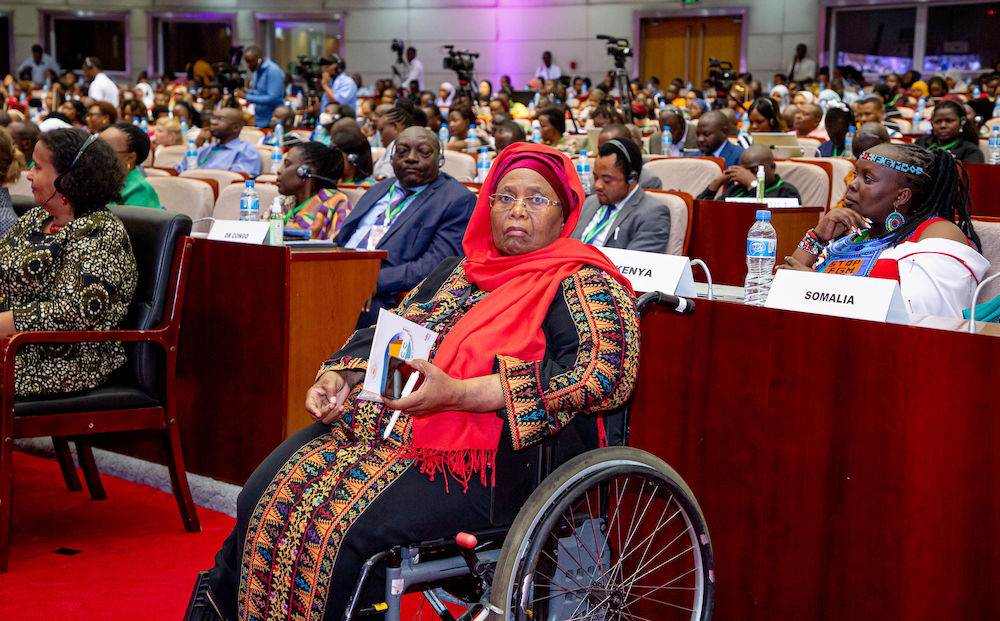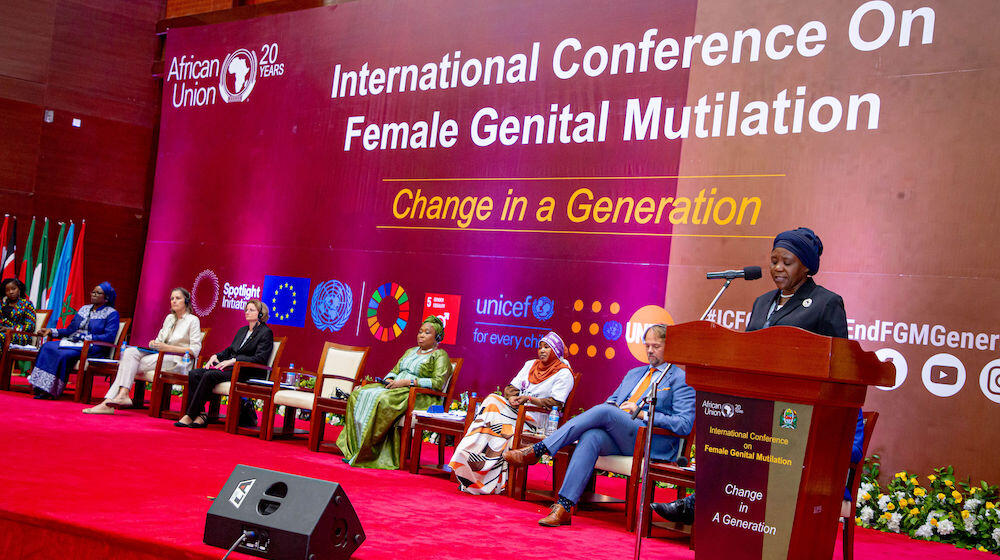PRESS RELEASE
DAR ES SALAAM, Tanzania – With the backing of the African Union, UNFPA, UNICEF and the Spotlight Initiative Africa Regional programme, the 2nd International Conference on Female Genital Mutilation brought together more than 650 people to develop a comprehensive plan to accelerate global action against FGM, a gross human rights violation.
Globally, more than 200 million women and girls globally have undergone FGM, and more than 20 million of these procedures – or one in ten – were performed by health professionals. Nearly four million girls are at risk annually of undergoing FGM, with a further 68 million girls expected to be affected by 2030, of which Africa will account for about half.
"We must declare, enough is enough,” said Tanzanian Minister of Social Development, Gender, Women and Special Groups, Dr. Dorothy Gwajima, as she emphasized the detrimental impact of FGM on women and girls' educational opportunities and well-being. “The practice of FGM, performed under the guise of tradition, is unacceptable. It's a form of sexual violence that our communities must no longer tolerate.”
The practice has violated the dignity of millions of women and girls. "Today, in this hall filled with passionate advocates, experts and policymakers, I see hope and determination. I envision a world where every girl grows up free from the shadows of FGM," she said.
Right to bodily autonomy

Echoing these sentiments, the representative of the European Union, Ambassador Christine Grau, emphasized the importance of women's autonomy over their bodies. "Our communities must renounce oppressive traditions, including FGM. This tradition, which constitutes sexual violence, brings severe repercussions for women." Within the EU alone, at least 600,000 women live with the consequences of FGM, with another 180,000 at risk.
Gilbert Kamanga, World Vision Country Director for Tanzania, highlighted the essential role of children as change agents. "When children are empowered and educated, they become formidable agents of change. These children, equipped with values from their formative years, ensure their communities remain progressive.”
Julius Otim, Regional Coodinator for the Spotlight Initiative Africa Regional Programme, stated that, "While the prevalence of FGM has declined over the past three decades, the progress is inconsistent globally. In regions where FGM is illegal, there's a troubling trend of the practice moving underground or crossing borders to evade legal consequences. This has been particularly noticeable in Africa, where despite legal bans, the practice persists and remains deeply entrenched in some areas.”
It was evident that there is an urgent need to enhance health sector responses, to address the rise in medicalized FGM and to raise awareness among health-care professionals about its harmful impact. Furthermore, cross-border FGM is escalating as a new concern, especially in areas such as Ethiopia, Kenya, Tanzania and Uganda. Only three African nations – Guinea Bissau, Kenya and Uganda – have laws criminalizing cross-border FGM. This situation is exacerbated by challenges such as conflict, climate change and other humanitarian emergencies. It is critical to address the matter with stricter legislation and community engagement to reshape perceptions and eliminate the practice.
Key actions and recommendations from the conference
- Health sector response to FGM: Amplify the role of the health sector to provide essential social and health services, including addressing the medicalization of FGM.
- Ending cross-border FGM: Prioritize regional cooperation and research.
- Consolidated action: Utilize a multisectoral approach, emphasizing the role of young people.
- Investment in data and advocacy: Promote the availability of disaggregated data at all levels.
- Fostering innovation and technology: Implement new methods of response, including using IT.
- Support for social movements: Strengthen the influence of younth advocates, civil society, cultural and religious leaders.
- Accountability: Strengthen global, regional and grassroots-driven accountability frameworks.
The participants' collective message was clear: The time for global action is now. With revitalized efforts and global collaboration, we aim to achieve a generation liberated from the horrors of FGM. The Spotlight Initiative Africa Regional Programme provided both technical and financial support to the conference.


